Abstract
Relevance of this paper is related to problems in implementation of directive of the Russian Federal Agency for Youth Affairs dated 08.02.2019 no.40 "On Approval of the Plan of Activities of the Federal Agency for Youth Affairs for the period of 2019–2024", which has its objective stated as "education of harmoniously developed and socially responsible personality on the foundation of spiritual and moral values of peoples of the Russian Federation, historical and ethnic cultural traditions". The authors understand educational environment as a leading factor in cultural development of future specialists independent of their major and professional field. At that, linguistic culture and communication culture of future medics is an element of social responsibility of each health care worker. It also includes linguistic foundation of communication between students, clarity of enunciation on behalf of the communicator. Contemporary higher medical education is becoming international, multicultural, implying exchange in cultural values and traditions, while representation of foreign vocabulary is constantly changing. This paper is aimed at resolving issues in autonomy and originality of the Russian linguistic culture in a foreign language environment. Functional features of the Russian language as a basic cross-cultural platform among youth are demonstrated. The authors conducted a study of linguistic component of student social responsibility, involving students of Saratov State Medical University named after Razumovskii and covering 164 respondents. The paper presents the research results from studying transformation of the Russian language in student youth in the medical university environment.
Keywords: Educationeducational environmentlanguagesocial responsibilitystudents
Introduction
The authors’ position is informed with the National Project “Education”, which states a necessity to educate a socially-responsible person, while mentioning value component related to mentalities of peoples populating Russia and importance of preserving ethnic cultural traditions. In this context, possibilities of educational interaction between instructors and students are explored as a cross-cultural phenomenon in the Russian education, allowing preserving ethnic values through development of student social responsibility.
The authors support the contextual approach (Arkadiev, 2011) to research into linguistic component of the social responsibility being studied. The previous study of social responsibility (Evdokimova & Evdokimov, 2016) allows generally stating that social responsibility is a “capability of a group or its participant to fulfill liabilities (promises) to society, collective, person". At that, social responsibility mediates social behavior of a person; actualizing life orientation cues the subject commensurates them with possible social well-being. In this context, a clear idea of one’s linguistic identity (Stepanova & Symaniuk, 2019) allows the person to develop as a member of culture of one’s ethnicity.
Contemporary trends in development of digital technologies in learning are, on the one hand, expanding communication field of young people, expand educational space, while on the other hand, limiting real-life communication between peers, substituting it with virtual contacts. Being in contact with one’s gadget, the subject is limited in emotional anticipation of conversation and thus is forced to use general language with elements of slang to bring up subjective emotions.
At the same time, various abbreviations arise, which do not enrich speech in any way, while expanding the field for superfluous words. Moreover, ethnic linguistic identity is being washed out by means of foreign words that change the mentality among the youth, touching upon communicative responsibility. Research into theoretical foundations of communicative responsibility (Voronina, 2013) allows for a conclusion that the content of this idea is primarily explicated from the positions of the ethical approach. In this context, the communicative responsibility implies a careful moral interpretation of solutions and actions, orientation to a dialog.
Communicative responsibility is a "capability of a person to independently select verbal and non-verbal ways of generation, correspondence and coordination of meanings and actions during the communication in accordance with social, moral and legal regulations adopted in a society or community". In that context, educational interaction between the participants of educational process in a medical university implies actualization of speech performance selection based upon individual mental vocabulary of a person (Sapogova, 2019), as a carrier of information about freedom and volition, directly related to selection, self-actualization and responsibility to others. Thus, the social responsibility serves as a member of the linguistic culture, while the communicative responsibility serves as a transmitter of previously acquired values and meanings of a person that expresses one’s attitude to those around through speech, symbols or gestures. Due to that, a possibility of preserving originality of the Russian language is directly linked to development of social responsibility in students, as discussed below.
In this paper, the authors use the structural-functional approach that allows analyzing each element of the structure in its functioning. Social responsibility includes components that regulate social relations. Due to that, the linguistic component may be seen from the point of view of educational interaction as an element in the student social responsibility.
Researchers had a task to determine what aspects and in what way form the linguistic component of the student social responsibility. In that respect, the authors attempted to study the linguistic component of the social responsibility in students of a medical university.
In terms of theory, it has been made clear that development of the linguistic component of social responsibility of students is influenced by the students themselves, through their interactions with each other, and also by their instructors, parents and environment. These four components were taken into account, interpreted and applied as a functional foundation for development of the linguistic component of student social responsibility.
A range of questions had been determined, including considerations of criteria and indicators. Interactions between the principal linguistic unit, a word, with various systems of human cognitive structures that integrate knowledge, perception, memory were taken into account (Erofeeva & Chernousova, 2019). Activity of actor’s position with respect to languages was considered, with accounts for the number of languages being studied and depth of linguistic knowledge. It was meant that mastering languages forms student’s multiculturalism (Astashova, Bondyreva, & Zhuk, 2019), which in its own turn stimulates active development of one’s social position and personal social responsibility, which in its own turn enriches and deepens the knowledge of one’s native language. Criteria of the linguistic component of social responsibilites are: activity of subject’s position, literacy, motivation to learn a language, personal attitude to language transformation, linguistic identity, speech culture in the Russian language, special training, education, empathy.
Additionally, a significant role in formation of the linguistic component of student social responsibility was played by various aspects of the educational environment. In the educational environment (Iasvin, 2001), the authors studied influence of immediate circle (parents, relatives, friends, peers, etc.) and participants of educational process (students, instructors, professors).
Problem Statement
Ways to preserve autonomy and originality of Russian linguistic culture in a foreign language environment, related to features of its functioning in the educational environment of tertiary education.
Research Questions
Research questions consider social responsibility of students, linguistic component of the student social responsibility, educational aspects of preserving autonomy and originality of the Russian linguistic culture in a foreign language environment in a medical university.
Purpose of the Study
The purpose of the study is to explore the linguistic component of social responsibility in undergraduate students of first and second years and first year medical residency students of the Razumovskii Saratov State Medical University in order to facilitate preservation of autonomy and originality of the Russian linguistic culture in a foreign language environment.
Research Methods
Research methods used are questionnaire, ranking and statistical analysis. The authorial method for studying the linguistic component of social responsibility in medical students is based upon the value-based approach. Within the framework of the research, a questionnaire was developed aimed at medical students and including 22 questions, covering preferences and actions of respondents in application of linguistic means when communicating with people around them. The questions included into the form are mainly analyzed below in the context of formative criteria of the linguistic component of social responsibility. The research has been conducted at the facilities of Razumovskii Saratov State Medical University and involved first and second year students majoring in Dentistry and Medical Care, as well as first-year medical residency students. Sample size of the experiment is 164 students aged 17–25.
Findings
The first criterion for formation of the linguistic component of student social responsibility is Activity of Actor’s Position. The principle indicator of this criterion is defined as presence in students of an aspiration to study languages. More than 86 % of respondents are conversant in two, three or more languages. Figure
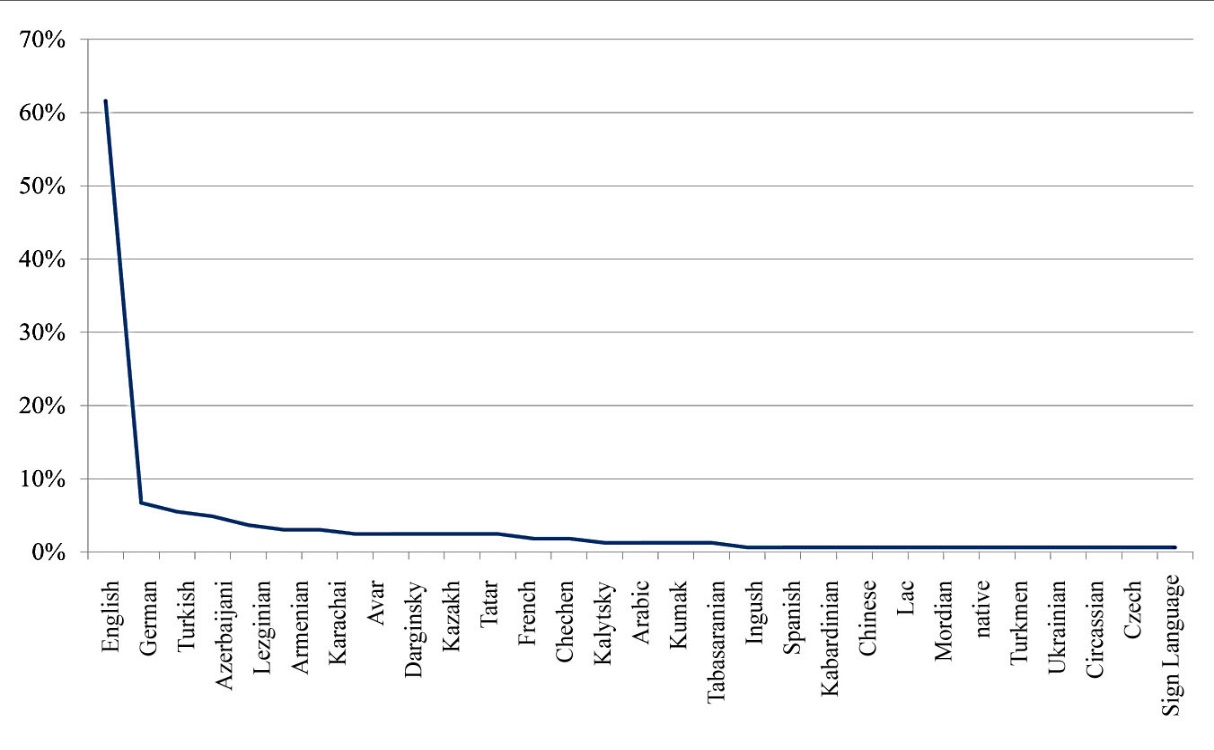
Among the languages that student can communicate in besides Russian, English dominates (62 %). According to the survey, German, previously studied on par with English, is now known to 9 times less students (7 %). French, the language of international diplomacy is at the 12th position, between Tatar and Chechen. The third position, after English and German is taken by Turkish (5 %), followed with Azeri (5 %), Lezgian (4 %), Armenian (3 %). Traditional Romance-German languages are substituted with languages of Turkic, Armenian and various Caucasian groups. Interest to eastern languages continues to grow, the survey revealed students studying Korean and Chinese.
Under the number 26, there is a rank for “Native” language: some students still do not wish stating their ethnicity and language in questionnaires. Many students with Turkic surnames stated Russian as the only language they speak. The same students evaded attempts at clarification.
The second indicator of actor’s position activity is related to comprehension or lack thereof with respect to corruption of the Russian language and students’ understanding of factors determining this dynamics. 80 % of respondents noted degradation of the Russian language, 10 % supported development of linguistic culture. The most important causes for negative processes according to the students: lack of face-to-face interaction, people reading few books, changes in educational system, reduction in the number of carriers of high-culture Russian, social networking sites, new words are not appearing but borrowed under the pretense of globalization, Internet changes mentality, inaction of the state, lack of enthusiast teachers, substitution of one culture with another, spell checking in gadgets, propaganda of foreign languages in media, cinema industry.
The third indicator of actor’s position is related to one’s attention to abundance of foreign words in media, on signboards, in street advertisement.
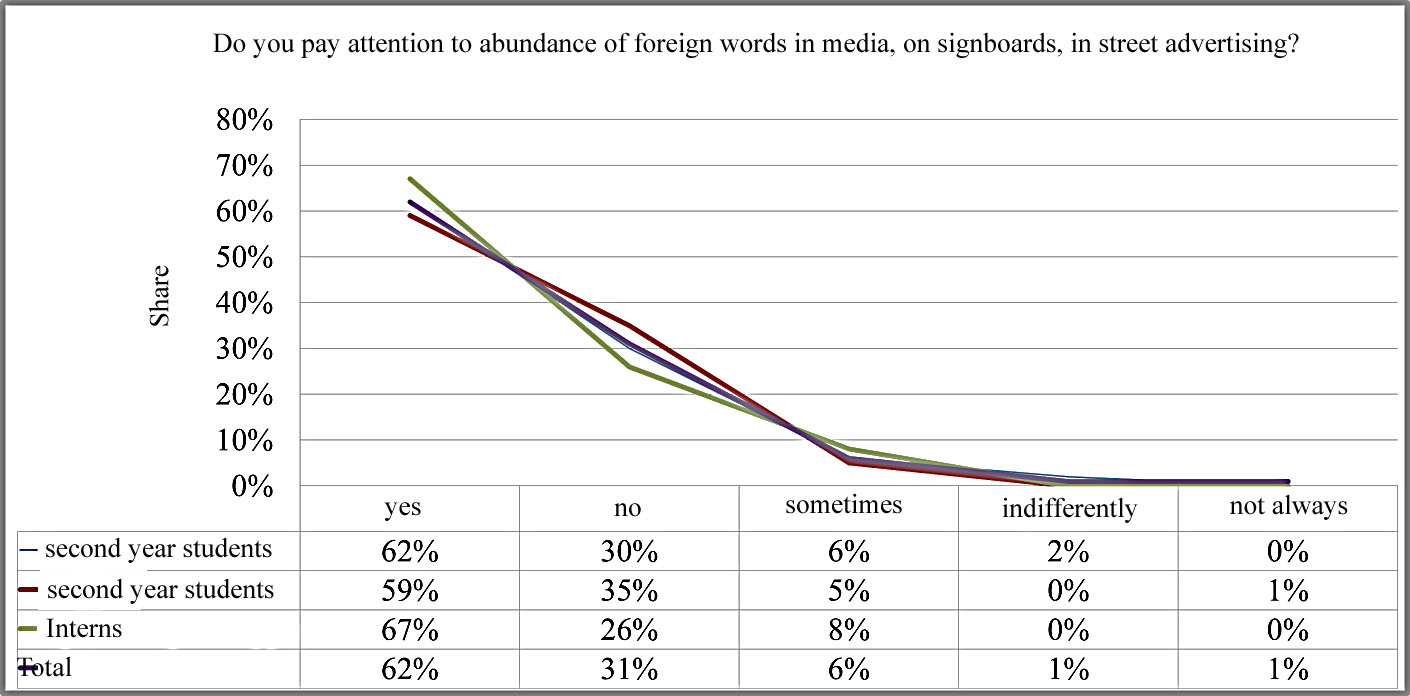
A large number of foreign words causes a healthy interest in the younger generation, but with aging this interest is fulfilled and only indifference remains. For example, 31 % no longer pay attention to foreign words, 62 % still notice them (Figure
The fourth indicator of subject position relates to one’s attitude to abundance of foreign words in media, on signboards, in street advertisement.
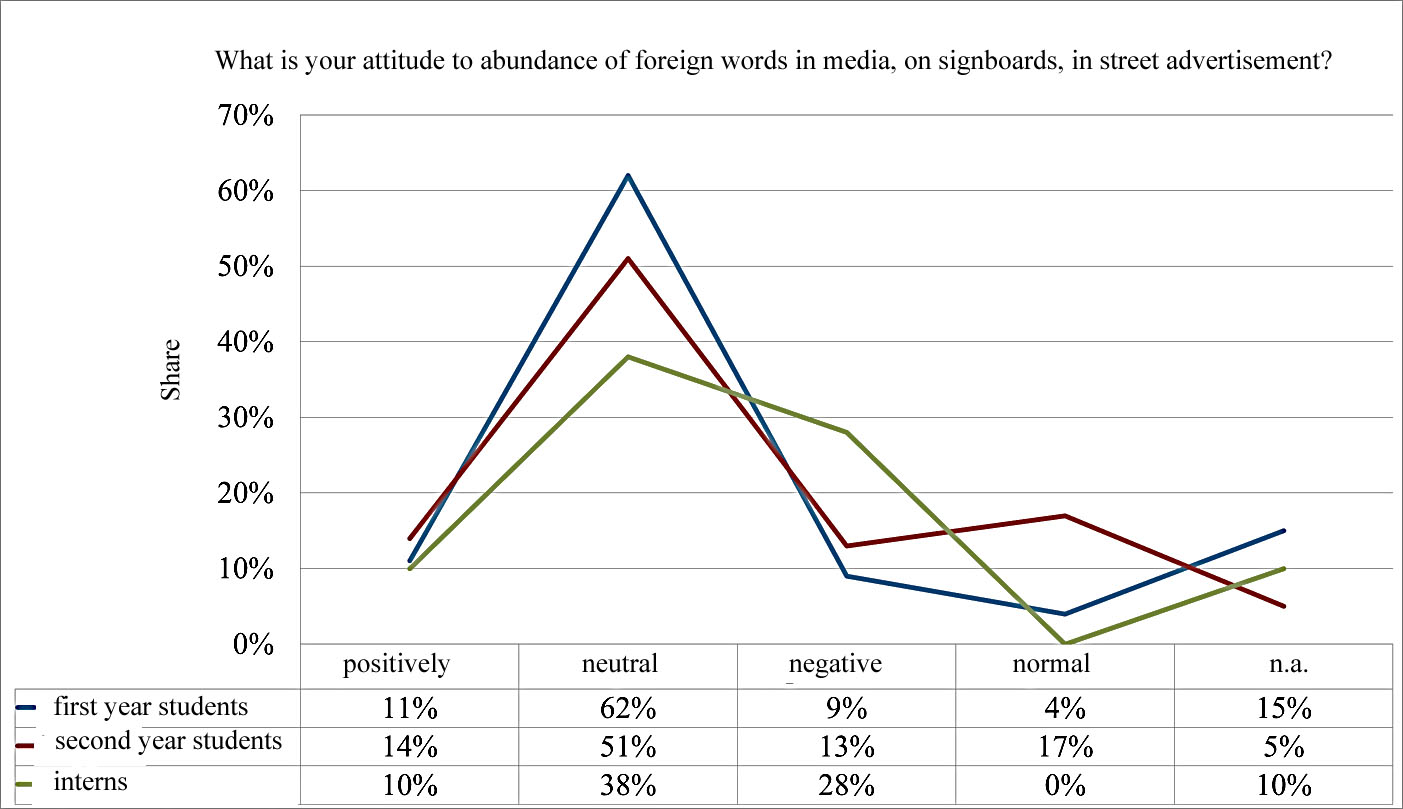
Foreign words in media, on signboards, in street advertisement in their abundance start causing emotional reaction. Thus, the percentage of students with a negative attitude increases from the first year to the second year and then to residency (9–13–28 %, respectively) (Figure
The second criterion of the linguistic component of student social responsibility implies respondents’ linguistic competence. The first indicator of the linguistic competence corresponds to their attitude to ungrammatical spelling of Russian words in advertising. The basic stereotype of everything written for the public shall be correct, is being radically disrupted. The common manipulative practice of misspelling in advertisement or just lack of knowledge of grammar on behalf of wanna-be designers cause a backlash in 84 % of respondents; 10 % have neutral attitude to this development.
The second indicator of linguistic competence of respondents is a frequency of foreign words use. Transformation of the linguistic component of student social responsibility manifests in borrowing and accumulation of a large number of foreign words in the language. 22 % of students actively use such words, 54 % use them rarely. Only 6 % never use foreign words.
The third criterion indicates student’s motivation to studying a language. The first indicator is based upon scientific character of terminology being used. Active use of scientific terminology in conversation is one of criteria for student’s mastering professional knowledge and terms, a status attribute of a professional. A degree of mastering medical concepts reflects systematicity in formation of competences that are required by national professional standards.
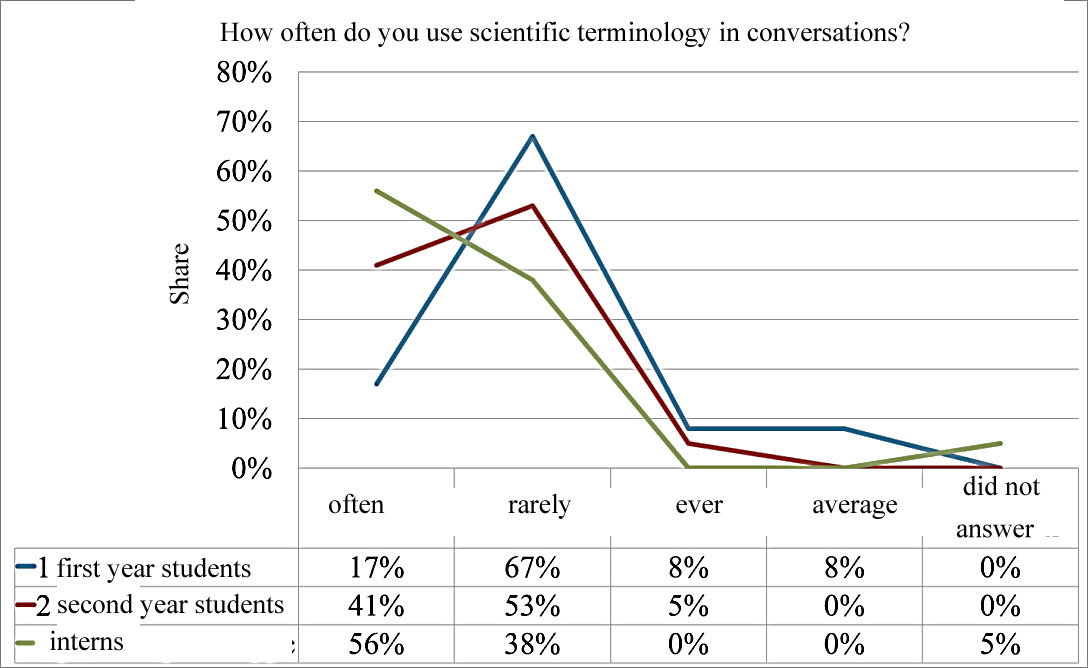
The results of the survey among the students of various years of study demonstrate increase in the frequency of scientific terminology use: 17–41–56 % (Figure
The second indicator of language study motivational criterion is based upon attention to grammatical mistakes made by others and actor’s attitude to them. The problem of grammatical mistakes is one of the key moments in value attitude to the linguistic component of student social responsibility, as it reflects subject’s position with respect to the fact of irresponsible attitude to the Russian grammar. In this case, it includes personal sphere, as most commentaries are emotionally loaded and may get various interpretations. Understanding this thin line, almost all the students answered similarly: about 50 % of respondents note mistakes and have a negative attitude, about 40 % note mistakes and have a neutral attitude. Insignificant variations may be found in the variant “I don’t pay attention to mistakes” (15, 6 and 3 % for first year, second year and residency students, respectively). Also, in the variant “Pay attention to mistakes and regard them negatively” (first year students – 36 %). This situation is determined by unopinionatedness of the first year students, their status still being actively formed (Figure
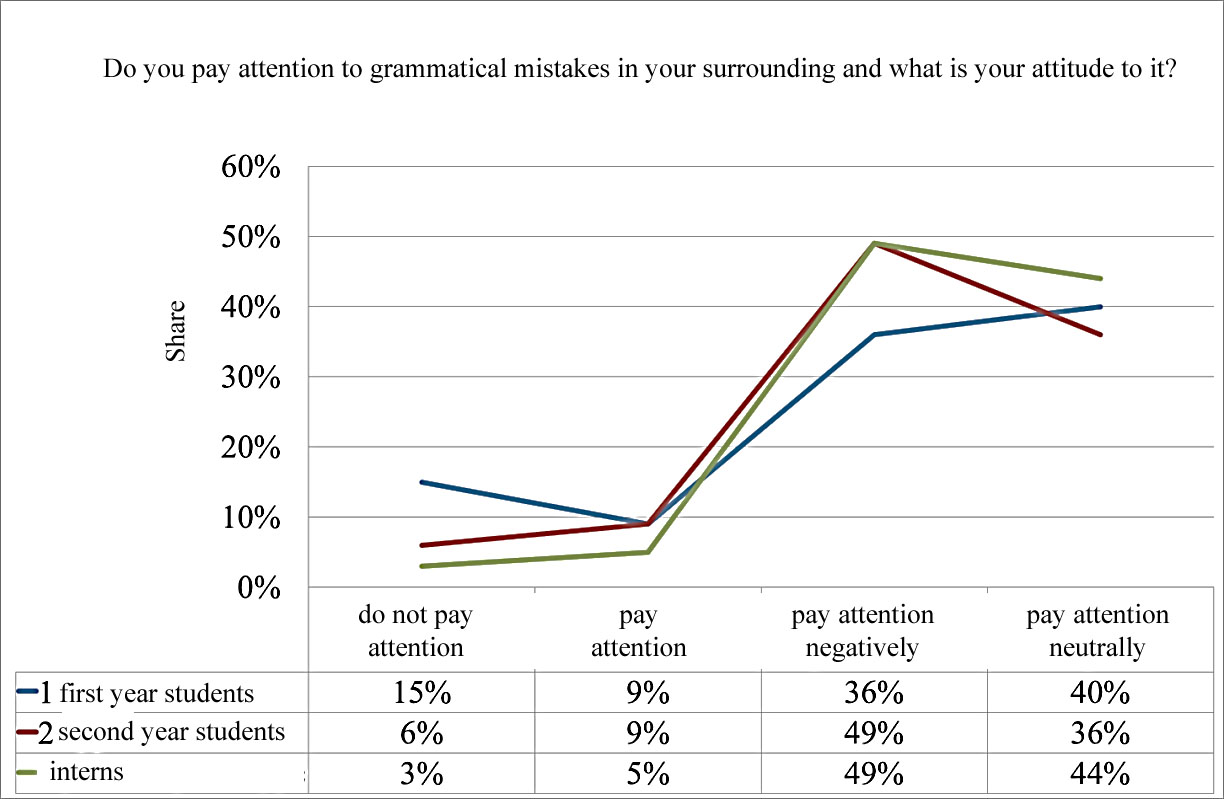
The fourth criterion, demonstrating personal attitude to transformation of language implies frequency of turning to youthspeak.
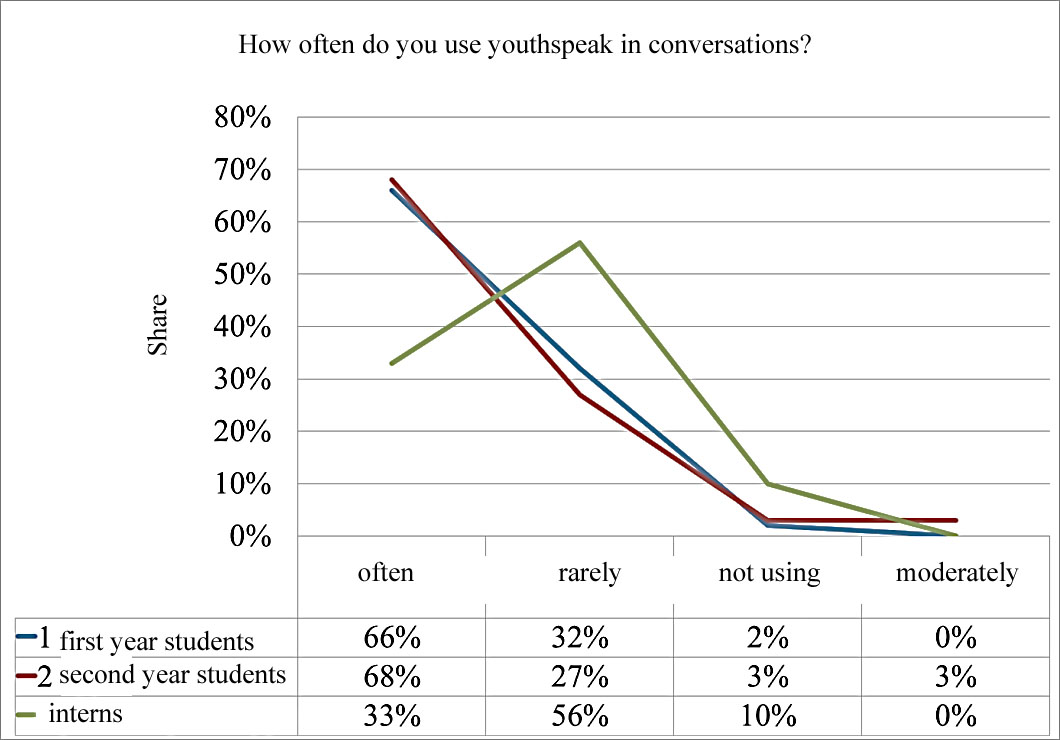
A wish to gain a footing and to follow linguistic attributes of one’s social group, be a repository of paradigm-forming texts and terms leads to active use of youthspeak. The degree of use of slang words is also influenced by self-assessment and personal conformism level. As an evidence of actively trying to establish oneself among their peers, the results of the survey show that close values in the use of youthspeak among the students of the first and second year (66 and 68 %, respectively). The same indicator is 38 % among the residency students, which is a result of their professional self-affirmation, increased self-esteem and social responsibility.
The fifth criterion is related to linguistic identity and shows a picture of respondents communicating in daily life, with relatives and friends in their native language. The Russian language is used especially during the educational process and is perceived by students of other ethnicities as a language of interethnic communication.
The sixth criterion, demonstrating cultural content of the linguistic component in student social responsibility relates to extensive reading of classical literature. Elite nature of medical education cedes ground, as only 75 % read classical literature, 18 % respondents do not read classics at all. One respondent said that through all their life they have not read a single book, and this is a future medic.
The seventh criterion, assuming special training in linguistic centers did not have mass coverage. To the contrary, it demonstrated single cases of such training, but the number of languages studied then increased to four.
The eighth, educational criterion is related to using terms from classical literature in conversation, demonstrated lack of extensive reading on behalf of the students. Using the terms from classical literature is a criterion of general culture and wide reading. It reflects to what degree literary imagery fills the inner world of a student and is a part of one’s worldview and mental outlook. Answering this question the medical students have shown a very low literary culture: 71 % of them rarely use the terms sourced from literary texts.
The ninth criterion is Empathy; it demonstrates rationality of communication, understanding between the subjects of educational communication. Russian language served as a means and tool of international communication for many years. As a result, currently 68 % of surveyed students face no difficulties in using Russian for communication with representatives of other ethnicities. This result witnesses to a positive attitude to the Russian language as a convenient and functional tool.
Conclusion
The conducted study of the state of the linguistic component of student social responsibility involving students of Razumovskii Saratov State Medical University and covering 164 respondents allowed for the following conclusions.
Criteria of the linguistic component of social responsibility have been established as follows: activity of actor’s position, literacy, motivation to learn a language, personal attitude to language transformation, linguistic identity, speech culture in the Russian language, special training, education, empathy.
According to the first criterion of formation of the linguistic component of student social responsibility related to activity of actor’s position, most respondents have shown understanding of self-development determined through aspiration to study languages. Most students are fluent in two or more foreign languages. At that, the proficiency has a trend to shift from western languages to eastern ones: Romance-German languages are substituted with Turkic languages and other languages of the East. Second, there is a positive dynamics from the point of view of having a concern for transformation of one’s native language: 80 % of respondents noted degradation of the Russian language, corresponding this fact to lack of face-to-face interaction and deficit of enthusiastic teachers. Thus, an educational problem is revealed, that is, an insufficient number of teachers in relevant subjects. Third, abundance of foreign vocabulary in media, on signboards and in street advertisement shows development of social responsibility in students: the younger generation demonstrates interest, but with aging it is fulfilled and only indifference remains.
As educational interaction in the medical university implies selection of speech rendition, as a carrier of information on freedom and volition, directly related to choice, self-actualization and responsibility to those around, there was a positive dynamics in this component of the linguistic component of student social responsibility. Respondents’ attitude to linguistic competence was actualized as a negative attitude to ungrammatical spelling of Russian words in advertising. Moreover, students quite rarely used foreign words in their speech unless necessary.
The third criterion related to acquisition of professional competences also showed positive dynamics, which is related to motivation for linguistic studies. The results of the survey among the students of various years of study demonstrated increasing frequency in use of scientific terminology. A degree of mastering medical concepts reflected systematicity in formation of competences that are required by national professional standards. Moreover, use of scientific terminology, besides its functional meaning also has a personal significance. students emphasized that they use scientific concepts if their partner in conversation understands it. Additionally, there was a positive dynamics in student attention to grammatical mistakes in their surroundings. A position of subjective disapproval of a lack of responsibility with respect to the Russian grammar has been observed.
The fourth criterion, related to capabilities of preserving originality of the Russian language directly depended on development of social responsibility in students and also characterized it as a strong suit. Respondents demonstrated actor’s attitude to transformation of language, where the degree of slang use depended on self-assessment and level of personal conformism: frequency of youthspeak use decreased with a higher age of students, witnessing to increase in self-assessment and social responsibility.
The fifth criterion, explicating capabilities of educational interaction between the students and instructors as a cross-cultural phenomenon of the Russian education allowing preservation of ethnic values through development of student social responsibility demonstrated linguistic identity, presenting the Russian language as a language of inter-ethnic communication and demonstrating respectful attitude to it on behalf of all the participants of the educational process.
The sixth criterion determining belonging to elite medical education and related to understanding of comprehensive responsibility for life of others, high cultural level of a medic, has shown insufficient reading of classical literature among future medics, that is, young people read very few books, while 18 % do not read classical literature at all.
The seventh criterion, assuming actualization of conditions of the educational environment through special training in linguistic centers demonstrated single cases of such training, however, it increased the number of languages being studied.
The eighth, educational criterion related to using terms from classical literature in conversation, demonstrated lack of extensive reading on behalf of the students. It is linked to the sixth criterion.
The ninth criterion that identifies empathy, which is a very important quality for future medics, allows talking about rational communication and comprehension between the subjects of the educational communication. Currently, 68 % of surveyed students face no difficulties in using Russian for communication with representatives of other ethnicities. This result witnesses not only to a positive attitude to the Russian language as a convenient and functional tool, but to student social responsibility as well.
To summarize, it is possible to conclude that out of nine criteria that define the development of the linguistic component of student social responsibility in Razumovskii Saratov State Medical University only three criteria revealed shortcomings of the phenomenon under consideration. So, in the educational aspect it it necessary to stimulate development of wide reading among the students, promote studying classical literature, or just simple reading of books. It is also necessary to create conditions for higher interest in courses and classes; to reveal the link between the Russian language and issues in personal professional formation; to attract attention of students and instructors alike to the language’s multifaceted nature, creating more possibilities for special training in this regard. Additionally, there is a skill and wish to use terms and phrases from classical literature in one’s speech, which is not just expanding one’s perspective, but forming subjective worldview. Thus, it will promote cultivation of intelligence and culture in young medical specialists, as a person does only what the person thinks, and if they do not think, they will do nothing.
As a result of the conducted research, we may conclude that the linguistic component of student social responsibility as exemplified by the medical university students, is somewhat developed, however there are some educational peculiarities. So, lack of wide reading and generally unpronounced will to read is a weakness of the linguistic component of student social responsibility. Student’s time management also needs more attention, from both students themselves and adults, otherwise there is a risk of becoming dependent on social manipulations. A large role in that process is played by close environment, to be more exact, relatives and parents, who are also guilty of insufficient use of literary phrases and insufficient reading of classical literature.
Grammatical mistakes of others are not corrected due to higher empathy, determined by medical principle of abstaining from doing harm, as future medics do not wish to cause emotional distress. Thus, social responsibility mediates social behavior and defines meaning of life, a foundation of personal behavior in aspiration to actualize the need for social well-being. A clear idea or one’s linguistic identity allows the person to develop as a member of culture of one’s ethnicity.
On the positive side, one shall note the criterion of active actor’s position in all the indicators. There is a growth in professionalism from the first years of studies to the latter ones, as students reduce their use of youthspeak and increase their use of scientific terminology. The criterion related to capabilities of preserving originality of the Russian language directly depended on development of social responsibility in students and also characterized it as a strong suit. The respondents demonstrated actor’s attitude to transformation of language: frequency of youthspeak use decreased with a higher age of students, witnessing to increase in self-assessment and social responsibility. In this regard, social responsibility served as a member of linguistic culture.
In conclusion, let us note that this study is opening a field of studies dedicated to the linguistic component of student social responsibility, setting up the obtained indicators. The modern pedagogy faces a number of questions requiring searching joint and timely solutions for further development of the linguistic component of social responsibility of students, instructors and lecturers alike.
Thus, the responsibility system is personalized, each person understands their role and their responsibility for structuring the elements of the system during the process of personal development. At the contemporary stage of social institutes development, the responsibility system undergoes active transformation with the aim of subordinating all the areas of human activities to the control system. Linguistic culture as an element of ethnic and general culture serves as an essential indicator of changing system of social responsibility. It should be noted that a special place in this process is taken by specific features of interdisciplinary student interactions in the educational environment of a tertiary school. The fact of understanding expressive ways for self-expression on behalf of the new generation shall be taken into account, as it is evident from the case of a first-year student using scientific context to emphasize their social status: «I use it to show my superiority over uneducated people». This fact is directly related to the linguistic component of social responsibility and requires detailed scientific inquiry from the educational standpoint.
References
- Arkadiev, P. M. (2011). Text, time, and context. Selected papers of Carlota S. Smith. Problems in Linguistics, 2, 132–139.
- Astashova, N. A., Bondyreva S. K., & Zhuk O. L. (2019). Resources of dialogic educational space as a foundation for organization of multicultural education. Education and Science, 21(3), 29–49.
- Erofeeva, T. I., & Chernousova, A. S. (2019). Methodological approaches to studies of urban vocabulary. Language and Culture, 45, 188–204.
- Evdokimova, A. I., & Evdokimov, N. A. (2016). Modern environmental risks as a result of unformed social responsibility in students. Humanization of Educational Space (pp. 430–438). Moscow: Pero Publishing.
- Iasvin, V. A. (2001). Educational Environment: From modeling to design. Moscow: Smysl Publishing.
- Sapogova, E. E. (2019). Structure of a personal thesaurus: Existential-psychological approach. Siberian Psychological Journal, 73, 40–59.
- Stepanova, A. A., & Symaniuk, E. E. (2019). Ethno-cultural training as a factor in prevention of personal ethnic alienation. Education and Science, 21(5), 157–200.
- Voronina, N. A. (2013). Communicative responsibility and levels of its development: A theoretical aspect. Philological Sciences. Problems of theory and practice, 4(22), 47–41.
Copyright information

This work is licensed under a Creative Commons Attribution-NonCommercial-NoDerivatives 4.0 International License.
About this article
Publication Date
31 October 2020
Article Doi
eBook ISBN
978-1-80296-091-4
Publisher
European Publisher
Volume
92
Print ISBN (optional)
-
Edition Number
1st Edition
Pages
1-3929
Subjects
Sociolinguistics, linguistics, semantics, discourse analysis, translation, interpretation
Cite this article as:
Aleksandrovna, A. E., Igorevna, E. A., Anatolievich, E. N., Vladimirovna, T. I., & Valerievich, F. S. (2020). Educational Aspects In Forming A Linguistic Component Of Student Social Responsibility. In D. K. Bataev (Ed.), Social and Cultural Transformations in the Context of Modern Globalism» Dedicated to the 80th Anniversary of Turkayev Hassan Vakhitovich, vol 92. European Proceedings of Social and Behavioural Sciences (pp. 3543-3554). European Publisher. https://doi.org/10.15405/epsbs.2020.10.05.471

